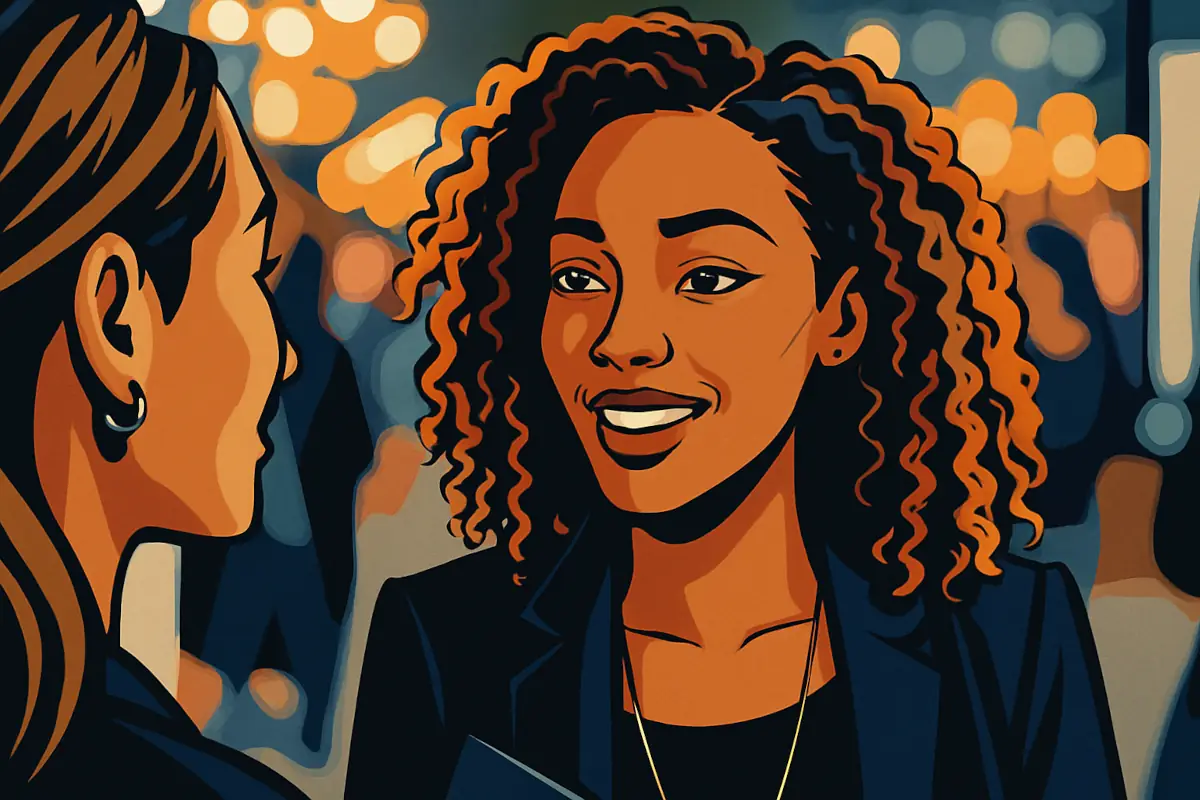The Room She Didn’t Think She Deserved to Be In
Morgan knew the email was coming. The conference director had hinted at it. Her boss mentioned it casually in a meeting, like a done deal.
Still, when it arrived, she felt something fold up inside her.
Subject: Keynote Confirmation – We’re thrilled to have you.
She didn’t reread the message. She closed her laptop and stood up, too fast. Her fingers tingled. Her chest tightened.
They made a mistake.
Not finally, not I earned this. Just: They think I’m someone I’m not.
The day passed in a blur of meetings and unread messages. When a colleague asked if she was excited, she smiled too wide and said, “I’m honored.” That was the safe word — honored — the one you could hide behind.
Inside, her stomach stayed tight. Like something was bracing for impact.
She started drafting the keynote that weekend. Nothing sounded right.
Too confident.
Too vague.
Too scripted.
Too raw.
Every sentence felt like it was trying too hard. She kept seeing a faceless audience squinting at her, waiting for her to make a mistake.
She deleted everything and started over three times.
At night, she couldn’t sleep. She lay on her back, staring at the ceiling. Her breath stayed shallow.
She thought of the time she got promoted and her VP said, “You really caught some lucky breaks this year.”
She thought of the professor who once marked her A paper and wrote, “Ambitious, but maybe too assertive.”
She thought of her mom in the living room before her middle school recital, kneeling down to adjust her hair and saying, “You’re representing all of us up there. So please, don’t mess up.”
None of these moments had felt like much on their own.
But together, they formed a kind of armor. Or a trap.
Three days before the keynote, she booked a small room at her coworking space to rehearse.
She made it seven minutes in before she choked.
Not dramatically — just a line she couldn’t get through. Her voice caught. Her heart skipped. And she froze.
She couldn’t finish the sentence. Couldn’t find the next one.
Her hands started to shake, just slightly.
She sat down. Didn’t cry. Didn’t move.
Just sat there while the hum of the AC filled the room like static.
The night before the keynote, alone in her hotel room, she thought maybe she was done.
Not just with the talk. With all of it.
Her chest was tight again. The same old vise. Her arms and legs felt heavy, and her thoughts were spinning so fast she could barely catch them.
She reached for her phone.
Not to call anyone. She knew no one would understand. They’d say things like:
You’ve got this.
You’re going to be great.
Don’t overthink it.
She didn’t want to be encouraged. She wanted to be understood.
She opened Instagram.
Cat videos. Recipes. A guy explaining how to pack a suitcase “like a CEO.” She kept scrolling, just trying to get out of her own head.
Then a video played without her tapping anything.
A woman sat on a porch, wrapped in a blanket, talking quietly to the camera:
“You know that feeling? Like you don’t belong in the room you’re in? Like your achievements were accidents, and someone’s going to figure it out?”
Morgan froze.
The woman kept going:
“That’s not proof you’re a fraud. It’s proof you care deeply. That you’re growing. That something inside you is expanding faster than your old beliefs can catch up.”
Morgan’s eyes burned.
The woman’s voice softened:
“You can’t logic your way out of that feeling. You have to feel safe enough to believe you belong. And that starts in your body.”
Then she demonstrated something. Gentle tapping, fingertip to hand, then to eyebrow, cheekbone, chest. No jargon. No instructions. Just rhythm. Just breath.
“Try this,” the woman said. “Even if it feels strange. Especially if it does.”
The video ended.
Morgan watched the screen go dark.
She didn’t believe in quick fixes. But nothing else had worked. She was exhausted — in her muscles, in her memories.
She sat up, crossed her legs, and tried it.
The tapping felt awkward. Too light to matter.
But it was something.
Tapping Sequence – Attempt 1
Even though I feel like I don’t deserve to speak tomorrow — and I wish I could disappear — I’m open to letting this feeling be here. Just for now.
Eyebrow: This fear is everywhere in my body.
Side of Eye: This fear of being seen.
Under Eye: I don’t want them to see through me.
Under Nose: What if I fail in front of everyone?
Chin: What if I’ve never actually earned anything?
Collarbone: I’m so tired of pretending I’m not scared.
Under Arm: I just want to breathe again.
Top of Head: Maybe I don’t have to fix this. Just feel it.
Her breath came easier after two rounds. Not perfectly. But enough.
She turned off the lamp without brushing her teeth. She lay down with the blanket over her legs and let the room be silent.
And for the first time in two days, she slept.
The morning came quietly.
Her chest still fluttered, but the panic had softened.
She showered. Reviewed her notes. Ate half a banana. Then sat on the edge of the bed.
She tapped again — not out of desperation, but to stay grounded.
She remembered something she’d read in a borrowed copy of Own Your Greatness, back when she first started therapy: High achievers mistake discomfort for evidence of fraudulence.
That wasn’t a red flag. It was a sign of growth. A nervous system catching up to the truth.
She hadn’t understood it then. Now it landed like permission.
Tapping Sequence – Morning of
Even though I’m still scared, I’m choosing to believe it’s okay to take up space.
Eyebrow: I can be scared and still speak.
Side of Eye: I can be nervous and still lead.
Under Eye: I’m allowed to feel this.
Under Nose: I’m allowed to want to do well.
Chin: I’m allowed to want to be proud of myself.
Collarbone: It doesn’t have to be perfect.
Under Arm: I don’t have to prove anything.
Top of Head: I get to show up as I am.
Backstage, the coordinator whispered her cue.
She tapped two fingers gently against her thigh — a rhythm now, not a ritual. A signal to her body: we’re not in danger.
When they called her name, she stepped out.
The lights were too bright to see faces. Her hands weren’t still. But her voice held.
She spoke about the version of success no one talked about — the quiet collapse behind polished bios. She named the shame of being seen. The fear that being chosen meant being watched. That any praise was a setup for a fall.
She saw people nodding.
She saw eyes welling up.
After the talk, someone approached her in the hallway — a woman, early twenties, badge still swinging on its lanyard.
She said, “You just looked so calm. Like you weren’t faking it at all.”
Morgan blinked.
Then smiled.
“I wasn’t,” she said.
She didn’t explain.
Back in the hotel that night, she wrote three things in her notebook she hadn’t felt brave enough to claim before:
I told the truth on stage.
I let myself be seen.
I stayed.
Then she tapped one more time, slowly.
Tapping Sequence – Closing
Even though I’ve doubted myself for years, I’m starting to believe I was never the problem.
Eyebrow: I used to think fear meant I didn’t belong.
Side of Eye: But fear is just part of growth.
Under Eye: I used to think I had to earn everything twice.
Under Nose: But I don’t owe anyone proof anymore.
Chin: I showed up. That’s enough.
Collarbone: It’s safe to trust myself now.
Under Arm: It’s safe to believe I’m capable.
Top of Head: I belong in the rooms I’m called into.
She turned off the light.
The hotel AC hummed the same quiet note it had the night before — but tonight, it didn’t sound like pressure.
It sounded like a lullaby.



